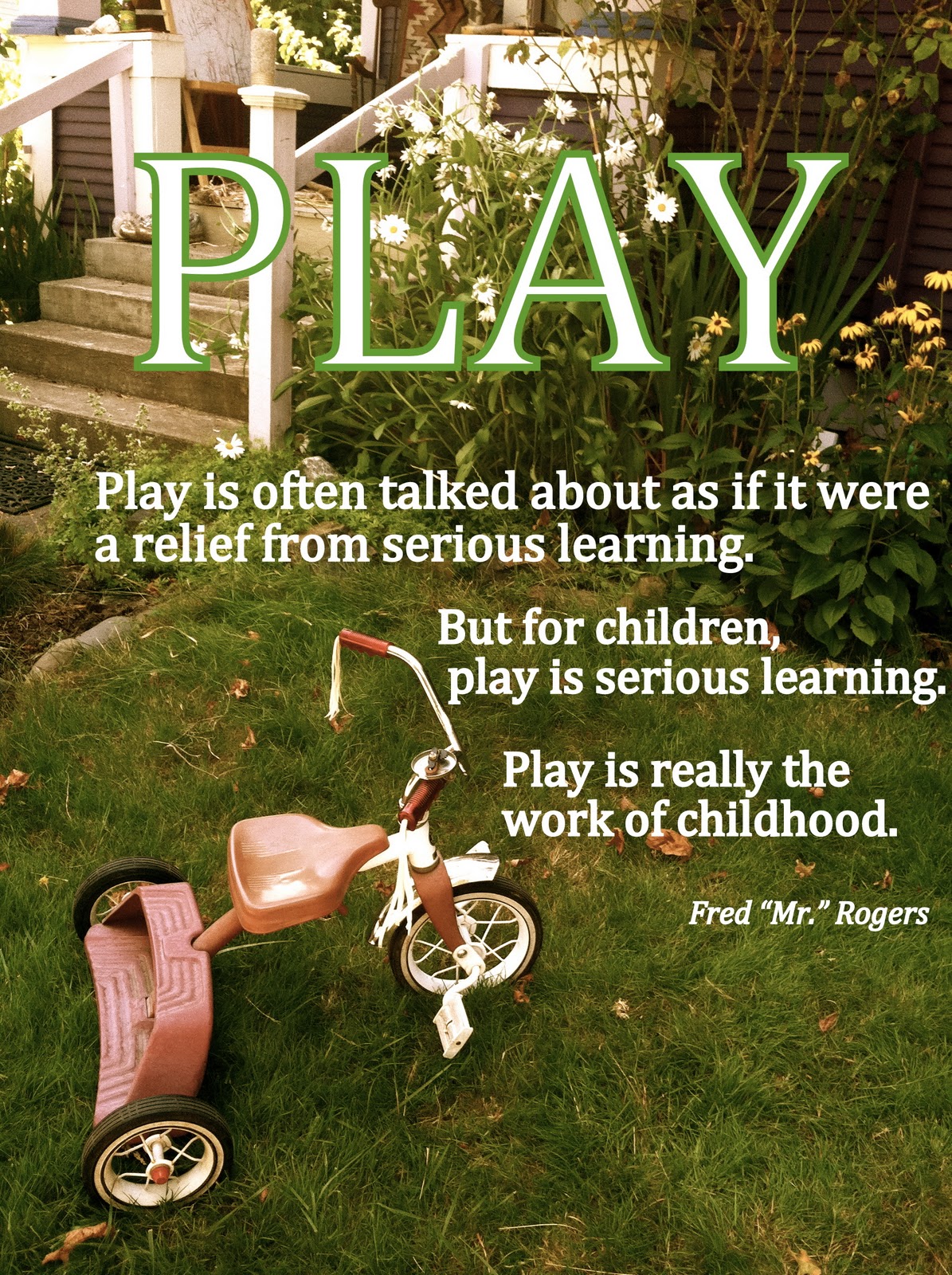Whoa, right? Makes me wonder what else we should rethink from math class? As a former middle school math teacher, I'm a little shaken up. (Though I hope I would be a much better math teacher today--I sometimes feel bad for the kids I taught way back when...)
Monday, December 31, 2012
Rethinking Math Class
Just came across this one via Twitter. (Thanks, @grantwiggins!) I had to watch it twice. You might too.
Whoa, right? Makes me wonder what else we should rethink from math class? As a former middle school math teacher, I'm a little shaken up. (Though I hope I would be a much better math teacher today--I sometimes feel bad for the kids I taught way back when...)
Whoa, right? Makes me wonder what else we should rethink from math class? As a former middle school math teacher, I'm a little shaken up. (Though I hope I would be a much better math teacher today--I sometimes feel bad for the kids I taught way back when...)
Philosophy of Education
It was near the end of the semester. Students were busy--and ready for Christmas break. And in Intro to Education, we broke out the heavy stuff: Philosophy of Education. I think it's fair to say that they were not very excited about this topic when they saw it on the syllabus. But also I'm happy to say that their interest increased pretty quickly as we got started.
To begin, I asked them list as many "-ism"s as they could think of. There were a lot:
- Pragmatism
- Constructivism
- Feminism
- Environmentalism
- Modernism
- Postmodernism
To begin, I asked them list as many "-ism"s as they could think of. There were a lot:
- Pragmatism
- Constructivism
- Feminism
- Environmentalism
- Modernism
- Postmodernism
- Calvinism
- Catholicism
- Secularism
- Futurism
- Relativism
- Capitalism
- Communism
- Socialism
- Marxism
- Darwinism
- Existentialism
- Realism
- Transcendentalism
- Rationalism
- Polytheism
- Monotheism
- Theism
- Atheism
- Deism
- Dualism
- Stoicism
- Buddhism
- Hinduism
- Humanism
- Terrorism
- Cannibalism (Wait...what?)
- Elitism
- Feudalism
- Paganism
- Intellectualism
- Anti-intellectualism
- Essentialism
- Perennialism
- Reconstructionism
- Progressivism
Sunday, December 30, 2012
Playing with Philosophy
The past few Saturday mornings I've been following an education Twitterchat as I have a cup of coffee. If you're an educator and on Twitter, I'd really recommend you follow along. The hashtag is #rechat, and we're talking about "rethinking educational practices." (Kudos to John T. Spencer for starting this one.)
Anyway, this week the topic was the importance of "play" in education. The conversation was fairly wide-ranging. I had several things to share...and I sort of surprised my self with how philosophical I was about things. (To be fair, I had been working on a post about philosophy of education the day before. But still...) We got talking about how important it is for students to play--and not just elementary school recess, but all the way on up, and in class as well as out of class. Really thoughtful stuff people were sharing.
 |
| Photo gratuitously pilfered from http://www.moogk-soulis.com/2012/09/its-all-about-play/ |
I have this picture hanging on my office door. I love this quote. Mr. Rogers is--as always--right. Play is serious learning. Play is the work of childhood.
I think the opposite should also be true: serious learning should always have an element of playfulness present as well. Playfulness is not the opposite of serious work. Play can be a useful element in the midst of hard work. My "create an album" assignment might be a good example--full of playfulness, but also a valid way for students to clarify their own understanding, as well as allow me to assess their thinking at the moment.
(Here's the really philosophical bit:)
As we chatted, I shared some of my own thinking about how different philosophies of education will probably think about the value of play. Essentialism sees the primary reason for education to ground students in "the essentials," so essentialist teachers will likely have a less playful teaching practice. Constructivism sees education more about students developing their own understandings, so constructivist teachers would likely embrace a lot more play in their teaching: students playing with ideas, playing with materials, etc.
As I'm reflecting on my own teaching experience--and recognizing the role constructivist thinking has in my own classroom practice--maybe it's not surprising that I'm apt to tell stories, assign my students to build weird contraptions, encourage them to share their thinking, experiment with alternative strategies, and...well...play around myself. I believe each teacher's personal philosophy of education shapes his or her classroom practice.
The chat was stimulating. I'm still thinking about it more than 24-hours later. I was challenged to think about (and rethink--ha!) the role of play in my own teaching practice. Fellow teachers, what do you think? How do you incorporate "play" into your classroom? What sorts of playful assignments do you give? And if you can't think of playful ways to engage your students, why is that?
Friday, December 28, 2012
Apps for Education in Higher Ed: 1:1 Goes to College
I'm thinking a lot lately about a 1:1 environment in higher ed. I'm going to be teaching in a high tech classroom this spring, and I'm working on rethinking my pedagogy accordingly. I'm debating about whether I should expect my students to come to class with a device every time we meet. At this point, I don't think I'll require it (it won't say so in the syllabus, anyway), but I'm curious to see how many will start to bring a laptop or tablet along anyway on a regular basis.
At any rate, I think the day is coming--and probably soon--when a tablet will be as commonplace in higher ed classrooms as they are becoming in elementary classrooms. MacFan that I am, I'm thinking especially about iPads right now. I'm wondering about the mindshift that will have to happen for professors to embrace tablets as a pedagogical tool? Because I'm convinced that tech tools should be able to transform teaching, and not just replace old assignments with newer, shinier versions of the old.
 |
| Photo courtesy Sean MacEntee (CC BY 2.0) |
Thursday, December 27, 2012
"That Was Easy!"
"Teaching is not for the faint of heart."
I think I said this at least half a dozen times this past semester to my freshmen in EDUC 101. We spent significant time looking at the challenges of teaching: the requirements for licensure, our culture's view of the teaching profession, the curricular demands, the challenges presented by working with a diverse student population, the difficulties of consistently applying a faith-informed philosophy of education. Teaching is not for the faint of heart.
On their final exam for Intro to Education, I asked the following question: "Are you still planning on being a teacher? Why or why not?" (To be fair I should note that this was really just for the interest of our department, and they couldn't get it wrong, per se.) Very interesting to read their responses to this. Most indicated that in spite of the challenges and potential downsides, they still feel called to teach. Others were less optimistic, but still sticking with a major in Education...for now. Several who came to the conclusion throughout the semester that teaching might not be for them even quoted my line above.
Teaching is hard work. Teaching isn't for everyone.
I've been in this profession for almost 15 years. I can admit it: there was a time when I thought teaching wasn't for me either.
On their final exam for Intro to Education, I asked the following question: "Are you still planning on being a teacher? Why or why not?" (To be fair I should note that this was really just for the interest of our department, and they couldn't get it wrong, per se.) Very interesting to read their responses to this. Most indicated that in spite of the challenges and potential downsides, they still feel called to teach. Others were less optimistic, but still sticking with a major in Education...for now. Several who came to the conclusion throughout the semester that teaching might not be for them even quoted my line above.
Teaching is hard work. Teaching isn't for everyone.
I've been in this profession for almost 15 years. I can admit it: there was a time when I thought teaching wasn't for me either.
Wednesday, December 26, 2012
A Game to Make You Think
In case you are running stuck with things for your middle schooler (or high schooler, or yourself...) to do over Christmas Break, let me encourage you to play a computer game. But this game is serious. It's a serious game--one intended not only to entertain, but also to educate.
The name of the game is Third World Farmer. The goal: survive as long as possible.
The name of the game is Third World Farmer. The goal: survive as long as possible.
On the Importance of Taking Breaks
Ah...Christmas Break! I still have a couple things to wrap up for the fall semester, but I'm looking forward to a week of downtime before I start planning for the spring.
My students furiously finished things up in a hectic week of projects and papers and exams. They are now safely home for a few weeks too. My own kids are enjoying a week and a half away from school right now too.
Teachers need breaks. Students need breaks.
I think breaks can actually help learning happen. In a school culture that is increasingly focused on time-on-task and other measurable inputs for education this might sound outrageous. But breaks are important, and provide times for new learning to "stick."
Breaks within the school day are very important for learning to happen. That's what recess is for, in part. (Of course, teachers will also say it's good for letting kids burn off some extra energy, which might be true, especially if they are keeping their kids chained to their desks "on task" the rest of the time. That's probably another whole post in the making...sorry to digress.)
My students furiously finished things up in a hectic week of projects and papers and exams. They are now safely home for a few weeks too. My own kids are enjoying a week and a half away from school right now too.
Teachers need breaks. Students need breaks.
I think breaks can actually help learning happen. In a school culture that is increasingly focused on time-on-task and other measurable inputs for education this might sound outrageous. But breaks are important, and provide times for new learning to "stick."
Breaks within the school day are very important for learning to happen. That's what recess is for, in part. (Of course, teachers will also say it's good for letting kids burn off some extra energy, which might be true, especially if they are keeping their kids chained to their desks "on task" the rest of the time. That's probably another whole post in the making...sorry to digress.)
Subscribe to:
Posts (Atom)

